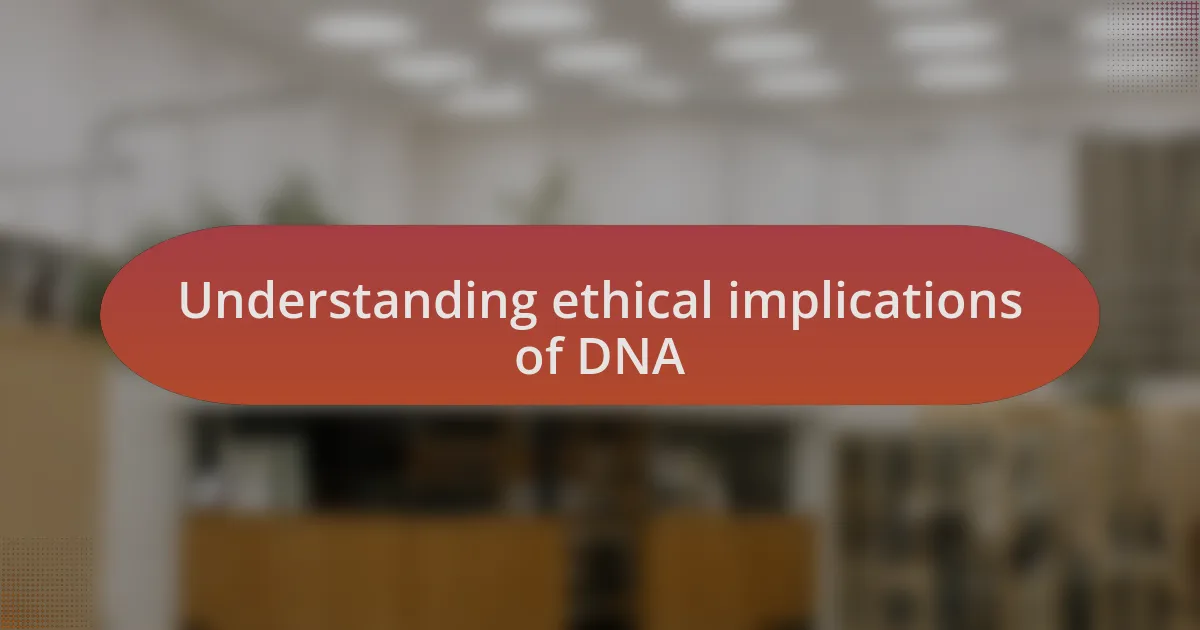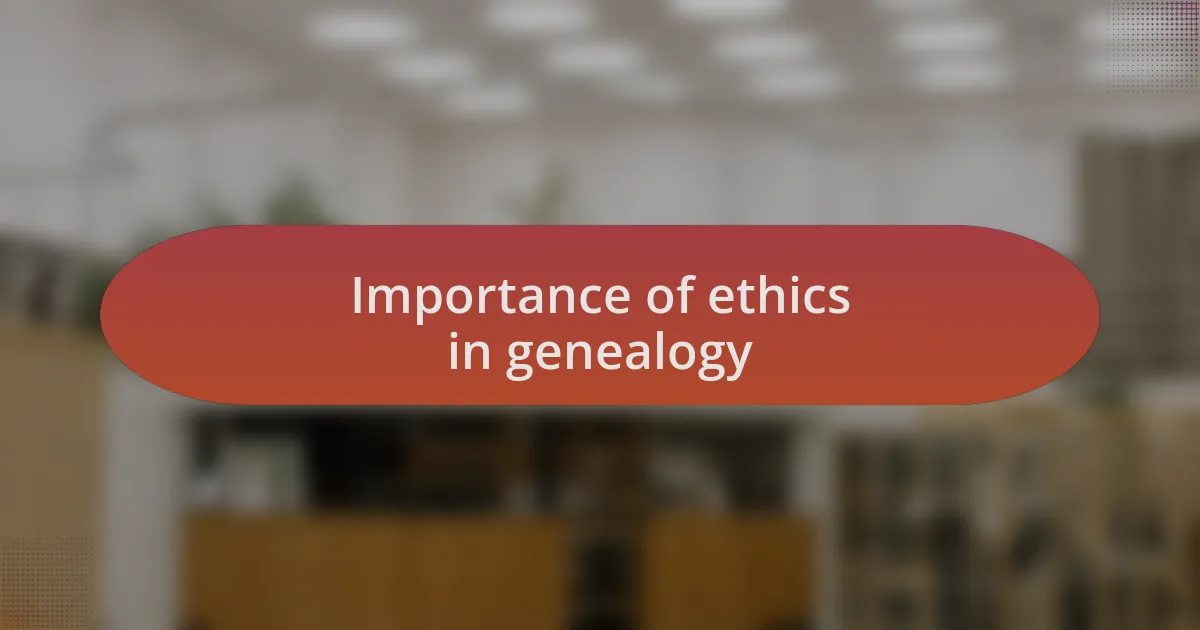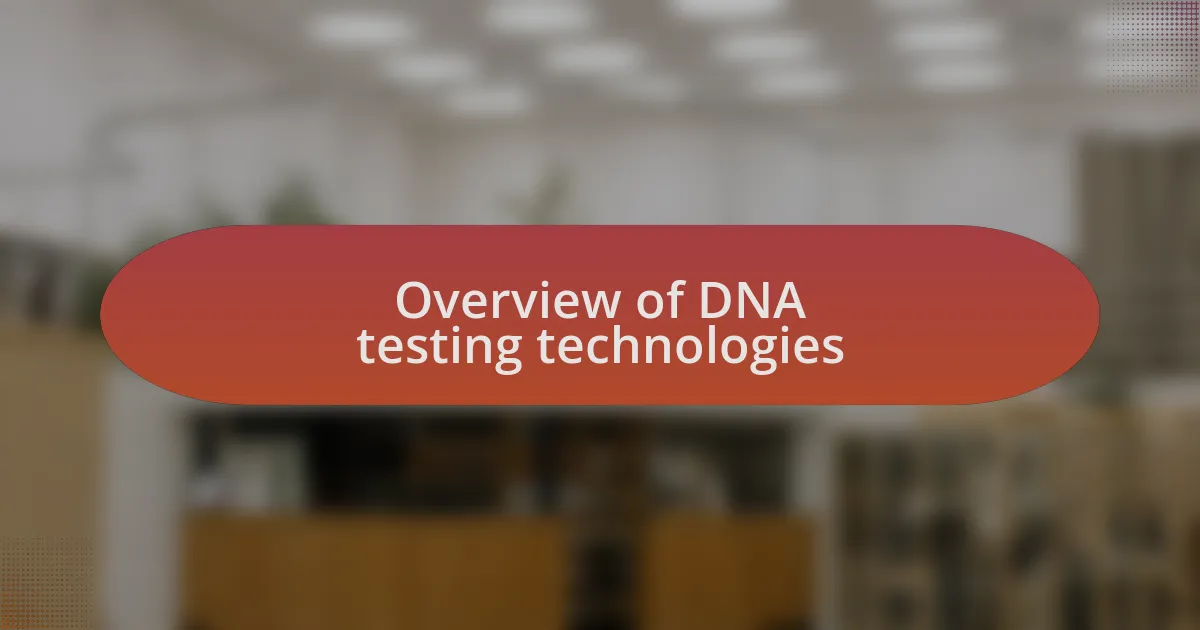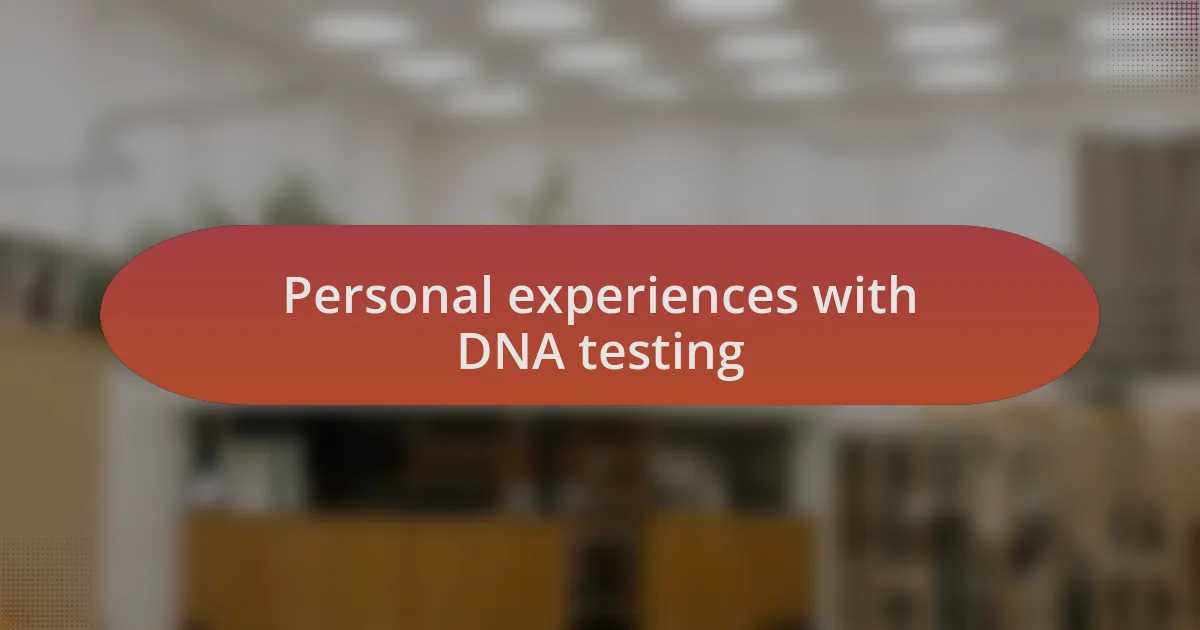Key takeaways:
- The ethical implications of DNA testing raise concerns about genetic privacy and the responsibilities we have regarding new family connections.
- Genealogy ethics are crucial when sharing sensitive ancestry information, especially regarding the consent and emotional boundaries of living relatives.
- Various DNA testing technologies have significant implications for understanding ancestry, but their accuracy can be variable, leading to questions about data trustworthiness.
- Personal experiences with DNA results can evoke a complex emotional response, prompting reflections on identity and the ethical responsibilities of sharing findings.

Understanding ethical implications of DNA
When we consider the ethical implications of DNA, it’s hard not to feel a mixture of fascination and concern. I remember the first time I learned about genetic privacy—how a simple DNA test can reveal not just my ancestry but deep, personal health information that I might not want to share. It raises the question: how much control do we really have over our own genetic data?
There’s also the emotional weight of discovering unexpected family connections through genetic testing. I once spoke to a friend who uncovered a half-sibling through a DNA match, an experience filled with joy but also a swirl of ethical dilemmas about how to navigate these newfound relationships. It makes us ponder, what responsibility do we have to the people we learn about from our own DNA?
I often find myself questioning the boundaries of ethical responsibility in genetic research. For instance, should companies that analyze DNA data have the obligation to inform customers about potential health risks tied to their findings? These are complex issues, and they ultimately prompt a deeper conversation about how we balance curiosity with the necessity of informed consent and personal privacy.

Importance of ethics in genealogy
Ethics is foundational in genealogy because it shapes how we understand and share our heritage. When I first delved into my family tree, the excitement was palpable, but I soon realized that ethical considerations extend beyond just facts and dates. How can we responsibly share information that could affect living relatives, particularly if it reveals sensitive details about ancestry that they may not be ready to confront?
I recall a stirring conversation with a fellow genealogy enthusiast who revealed unexpected family secrets hidden in her lineage. This experience highlighted the importance of consent; how should we approach sharing information that might disrupt families or alter identities? This not only reflects the duty we have to protect our relatives’ privacy but also raises the question of how to respect emotional boundaries while pursuing the truth.
Furthermore, as genealogists, we carry the burden of ensuring that our research does not lead to exploitation or harm. When browsing through public records or using DNA testing services, I often ponder whether these platforms truly prioritize ethical practices. Are we taking the necessary steps to safeguard the dignity and rights of those we’re researching? It invites an ongoing dialogue about our role as custodians of family history and emphasizes the need for ethical guidelines in our shared journey.

Overview of DNA testing technologies
DNA testing technologies have revolutionized the way we explore our ancestry and genetic heritage. From simple saliva samples to more advanced methods that analyze specific markers in our DNA, these technologies provide insights that were once unimaginable. I remember the thrill I felt the first time I unsealed that little test kit, wondering what secrets my DNA would unveil and how it might reshape my understanding of who I am.
At their core, there are several types of DNA tests: autosomal, Y-DNA, and mitochondrial DNA tests. Autosomal tests analyze DNA inherited from both parents, offering a broader view of family relationships, while Y-DNA tests are specific to male lineage. It still amazes me how these tests can trace back generations, identifying previously unknown relatives. Have you ever considered how a simple cheek swab could unlock a family history filled with unexpected connections?
Moreover, the accuracy of these tests can vary significantly based on the technology and databases used. As someone who has navigated this complex landscape, I often find myself questioning the implications of results that may not tell the whole story. Can we trust the data completely, especially when our identities and histories are involved? Each revelation invites reflection on how we interpret our results and what ethical responsibilities we bear in sharing these findings with others.

Personal experiences with DNA testing
The moment I received my DNA results, I was filled with excitement and a bit of trepidation. The report revealed ethnicities I had never imagined, sparking an inner dialogue about my identity. Have you ever had a revelation that made you rethink your entire heritage? For me, learning about my unexpected European roots left me both exhilarated and thoughtful.
As I connected with newfound relatives through the testing platform, it was surreal to consider the stories each person carried. One cousin shared family photos that had been lost to time, and I felt a surge of gratitude for the technology that facilitated this reunion. In sharing these experiences, I often wonder how many people miss the chance to explore these connections because they fear the unknown.
Yet the journey hasn’t been without its challenges. I grappled with the ethical implications of sharing my results, especially in relation to family members who may not have chosen to participate in this journey. What responsibility do we hold when our findings could impact others? The weight of these questions constantly remind me that DNA testing is not just about personal curiosity; it reflects the intricate web of relationships we all share.